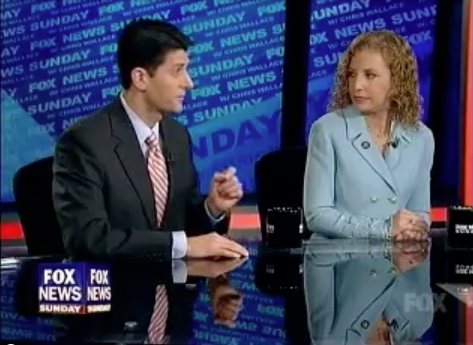Rep. Paul Ryan is an excellent debater, having bested President Barack Obama himself and many other opponents besides. But Ryan also has a few vulnerable points that Vice President Joe Biden will try to exploit at their debate at Centre College in Danville, KY on Thursday night. The way to defeat Ryan is to use his intellectual strengths against him, and emphasize the human side behind his abstract numbers, theories and policies.
That is something Democratic National Committee chair Debbie Wasserman Schultz–not the best of debaters, which is why the party has sidelined her during the last critical weeks of the campaign–managed to do during an exchange with Ryan in March 2010 over Obamacare on Fox News Sunday. Ryan arrived at the studio armed with facts and figures–and a portable “Ross Perot” chart–and destroyed the budget pretensions of Wasserman Schultz and her Democrats, who claimed Obamacare reduced the deficit.
Her defense was simple:
And while Paul is in the weeds on economic theory, I’d like to get in the weeds on how health insurance reform impacts everyday lives. And I’ll tell you, honestly, folks that I talk to, the 2.5 million breast cancer survivors in America, that I am one of, understand that we’re done with insurance companies dropping us or denying us coverage because of — because we have a preexisting condition.
Watching that exchange, I had the impression that Wasserman Schultz came away the winner. She did not really contest Ryan’s analysis–she merely dismissed it as irrelevant to the fundamental problem at stake. There were victims Ryan could have brought up–future victims denied treatment by cost-control boards, for instance–but he did not, and the personal edge Wasserman Schultz brought seemed to have caught him by surprise.
Ryan is a policy wonk, and finds refuge in numbers that make most other people’s eyes glaze over. His natural response to any proposal by the other side can be summed up as, “Okay, but at what cost?” He reminds voters that everything government does must come, at the cost of something else–including the prosperity of American households.
But “prosperity” is an abstract concept, and the personal, human cost of one person potentially benefiting from a government program, or suffering for the lack of it, is much more real and intense to many people in the audience.
Unfortunately for Ryan, that is the kind of argument at which Biden–for all his many flaws–excels. It was the basis for his much-maligned, but effective, speech at the recent Democratic National Convention.
Biden comes into Thursday’s debate with the advantage of low expectations. He doesn’t have to win–no one expects him to; he merely has to make Ryan stumble.
To that end, he will hurl all of the Obama campaign’s worst attacks at Ryan–because only Biden can get away with it–and he will tell stories, making them up if necessary (as he so often does), to argue that while Ryan may have facts and figures, he doesn’t have heart.
That is an argument for which Ryan must prepare. His sparring partner has been litigator Ted Olson–which is good preparation for a policy discussion, but less obviously helpful against a loose cannon like Biden.
The best example for Ryan to follow is that of Romney himself, who deployed a set of real-life anecdotes in his first debate against Obama. Ryan should bring some of his own–along with his charts–on Thursday.

COMMENTS
Please let us know if you're having issues with commenting.